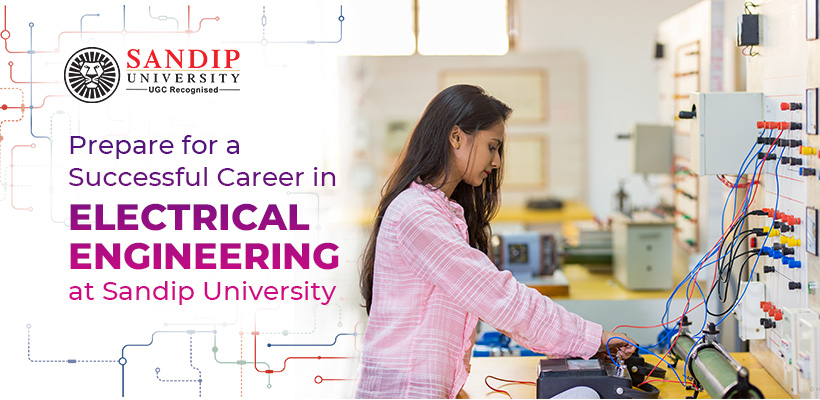In 2025, electrical engineering is all set to be at the heart of technological transformation, with industries worldwide experiencing a shift driven by sustainable energy, smart systems, and digitalisation. Pursuing B. Tech in Electrical Engineering from Sandip University offers students a chance to engage with these industry changes through a curriculum that combines solid theoretical foundations with practical skills. Here’s how Sandip University, a top engineering college in Bihar, prepares future engineers to lead in this evolving field:
1. Emphasis on Industry 4.0 and Digital Transformation
The shift towards Industry 4.0 impacts the entire engineering field, including electrical engineering. Sandip University keeps students at the forefront of these changes by integrating advanced subjects like smart grids, IoT applications, and artificial intelligence in electrical systems. The hands-on experience in these areas allows students to understand how electrical engineering aligns with modern-day requirements, from optimising energy consumption to enhancing the efficiency of industrial processes.
2. Focus on Sustainable Energy and Green Technology
With a growing emphasis on sustainable practices, electrical engineers are crucial in advancing renewable energy sources. At Sandip University, students explore energy-efficient solutions, covering areas such as solar power, wind energy, and electric vehicles. By engaging in projects and lab work dedicated to renewable energy, students gain the necessary skills to develop sustainable systems and are well-prepared to contribute to the global green movement.
3. Training in Emerging Technologies like Smart Grids and Automation
As cities move toward smart infrastructure, the demand for expertise in smart grids and automation grows. Sandip University’s curriculum ensures students are proficient in these emerging technologies, preparing them for roles in designing and managing intelligent electrical systems. Through workshops and guest lectures by industry experts, students gain a comprehensive view of real-world applications of automation in energy distribution and control systems.
4. Hands-On Experience Through Industry Visits and Practical Projects
At Sandip University, students are encouraged to participate in industrial visits and practical projects, bridging the gap between theoretical knowledge and practical application. For example, visits to grid substations and hands-on lab sessions allow students to directly engage with the mechanisms of power distribution, grid management, and high-voltage systems. This practical exposure is critical in building the skills needed to manage complex electrical infrastructures effectively.
5. Strong Foundation in Simulation and Design Software
Proficiency in design and simulation software is indispensable for today’s electrical engineers, enabling them to analyse and optimise system designs effectively. Sandip University integrates the use of cutting-edge software like MATLAB, Simulink, and other simulation tools into its program. By mastering these tools, students can simulate complex electrical circuits, work with control systems, and refine system designs, making them highly competent and job-ready upon graduation.
6. Interdisciplinary Learning and Skill Development
Sandip University emphasises a multidisciplinary approach, reflecting the industry’s demand for professionals who can collaborate across different domains. Students are encouraged to explore fields like control systems engineering, machine learning, and even coding, equipping them with the skills to work in areas like automation, robotics, and embedded systems. This flexibility makes them well-prepared to thrive in a rapidly evolving job market.
7. Expert Lectures and Industry-Aligned Curriculum
To stay current with industry advancements, Sandip University frequently organises expert lectures and interactive sessions led by professionals and researchers. For instance, recent guest lectures have covered topics such as control systems engineering, renewable energy, and the challenges of modern power systems. These sessions provide valuable insights into emerging trends, helping students align their learning with industry expectations.
8. Guidance from Experienced Faculty and Mentorship
Sandip University boasts a highly experienced faculty team that includes specialists in various fields of electrical engineering. The faculty not only deliver in-depth theoretical knowledge but also mentor students in research and practical applications, guiding them through every stage of their academic journey. This mentorship is essential in helping students make informed career decisions and develop a clear path toward their professional goals.
9. Opportunities for Research and Innovation
With a growing focus on innovation, Sandip University encourages students to pursue research and participate in project-based learning. Students are given the freedom to explore their interests, from working on projects involving sustainable energy systems to researching advanced power electronics. This culture of innovation ensures that students graduate as critical thinkers and problem-solvers, ready to contribute to the engineering community.
Conclusion
Pursuing a B.Tech in Electrical Engineering from Sandip University equips students with the technical knowledge, hands-on experience, and industry-aligned skills necessary for a successful career in electrical engineering. The blend of advanced digital skills, sustainable engineering principles, and practical exposure prepares graduates to become adaptable professionals ready to take on the challenges of a rapidly transforming industry. For students aspiring to make a significant impact in the field of electrical engineering, Sandip University offers a comprehensive platform to launch a fulfilling and successful career.

